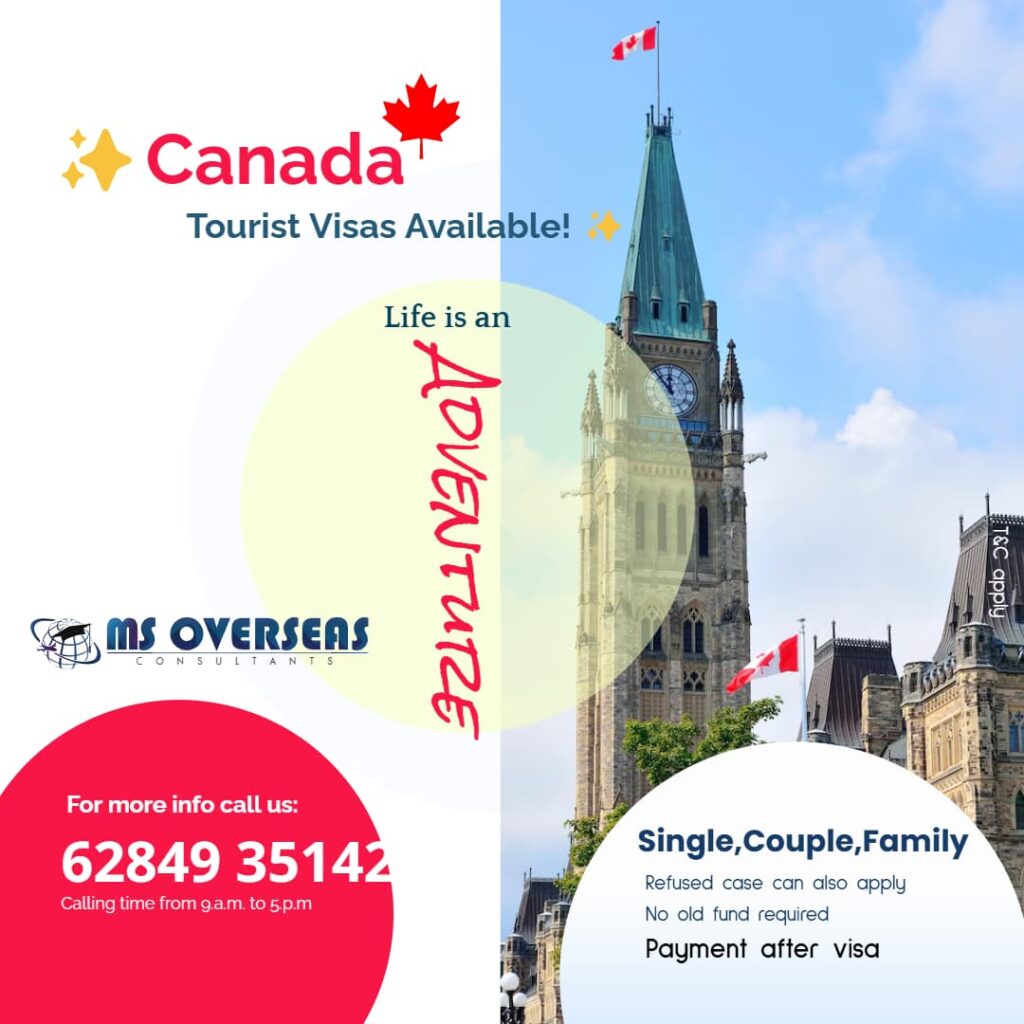Canada is renowned for its high-quality education system, welcoming environment, and diverse job opportunities, making it one of the top destinations for international students. However, recent changes to the country’s immigration policies may make it tougher for international students to obtain study visas and work permits. This move comes as part of a broader effort to prevent abuse of the system and ensure that the immigration framework remains effective and fair. Canada to Modify Work Permit
In this blog post, we will delve into the key changes impacting work permits and study visas for international students in Canada. Canada to Modify Work Permit
The Bigger Picture: Canada’s Immigration Policy Shift
Canada is making proactive changes to its immigration policy, focusing on reducing the intake of foreign students. The government is looking to control the number of international students entering the country, particularly following concerns about the abuse of visa and work permit programs. This decision is part of a larger plan to tighten regulations on immigration and ensure that students coming to Canada are doing so for legitimate reasons, such as obtaining quality education and contributing to the Canadian economy. Canada to Modify Work Permit

In addition to reducing the number of international students, the Canadian government is also targeting foreign workers and master’s degree students. By refining the rules around work permits and study visas, the government aims to better manage immigration and prevent the exploitation of the system. Canada to Modify Work Permit
8 Major Announcements Impacting Work Permits and Study Visas
Let’s take a closer look at the major announcements that are shaping Canada’s new approach to work permits and study visas for international students:
Reduction in Study Permit Intake Cap for 2025
Starting in 2025, the Canadian government will reduce the intake cap on international student study permits by 10%. This reduction is based on the 2024 target of issuing 485,000 new study permits.
The government’s goal with this reduction is to stabilize the number of international students entering Canada and ensure that only those who genuinely meet the country’s educational and economic needs are allowed to study and work.
Modifications to the Post-Graduation Work Visa Scheme
In addition to reducing the intake cap, changes will be made to the post-graduation work visa scheme. These modifications are expected to be implemented later this year and are designed to streamline the process and ensure that international graduates who remain in Canada to work are doing so in alignment with the country’s labor market needs.
Limiting Work Permit Eligibility for Spouses of Master’s Degree Students
One of the key changes coming later this year involves limiting work permit eligibility for the spouses of master’s degree students. Moving forward, only those whose programs are at least 16 months in duration will be eligible for work permits. This change reflects the government’s desire to focus on longer, more intensive programs that provide significant value to Canada’s economy.
Limiting Work Permit Eligibility for Spouses of Foreign Workers
In another effort to refine the work permit process, the government will also limit work permit eligibility for spouses of foreign workers. Starting later this year, only spouses of workers in management or professional occupations, or those in sectors with significant labor shortages, will be eligible for work permits.
New Language Requirements for Post-Graduation Work Permits
University graduates will need to meet a Canadian Language Benchmark (CLB) level 7 or 5, while college graduates will need to meet a CLB level 5. This change ensures that international graduates have the necessary language skills to thrive in Canada’s workforce and contribute to the country’s economy.
Changes to the Study Permit Intake Cap for 2025–2026
As part of the ongoing effort to regulate international student numbers, the study permit intake cap for 2025–2026 will include specific provisions for master’s and doctoral students. The Immigration, Refugees and Citizenship Canada (IRCC) will reserve approximately 12% of allocation spaces for these students.
Employer Caps on Low-Wage Temporary Foreign Workers
In 2025, employers in Canada will be subject to a 10% cap on low-wage temporary foreign workers. However, certain industries will be exempt from this cap, allowing them to continue to meet labor demands. This cap is part of a broader effort to reduce reliance on low-wage foreign workers and encourage businesses to invest in Canadian workers.
Proposed Reduction of Temporary Residents in Canada
The Canadian government has also proposed a reduction in the number of temporary residents from 6.5% of the country’s total population to 5%.
This reduction aligns with Canada’s broader immigration goals, which include creating a more sustainable and manageable immigration system that meets the country’s economic and social needs.

The Global Perspective: Impact on Indian Students
India is one of the largest sources of international students in Canada, with thousands of Indian students flocking to the country each year for higher education and work opportunities. However, the recent changes to Canada’s immigration policies are prompting some Indian students to consider alternative destinations for their studies.
According to Saurabh Arora, Founder & CEO of University Living, these changes may encourage students to look at other emerging destinations, such as Germany, Singapore, Italy, and Ireland. These countries are becoming increasingly attractive as top education choices for Indian students, offering high-quality education and diverse job opportunities.
While Canada remains a leading destination for international students, these changes underscore the expanding array of global opportunities available to students.
Prime Minister Justin Trudeau’s Response
In a series of posts on X (formerly Twitter), Canadian Prime Minister Justin Trudeau addressed the government’s decision to reduce the number of international student permits and low-wage temporary foreign workers.
“We’re granting 35% fewer international student permits this year, and next year, that number’s going down by another 10%,” Trudeau said. “Immigration is an advantage for our economy — but when bad actors abuse the system and take advantage of students, we crack down.”
Trudeau also highlighted the government’s decision to reduce the number of low-wage temporary foreign workers and shorten the duration of their work terms. He stated that these changes are necessary to encourage businesses to invest in Canadian workers and ensure that the labor market adapts to changing economic conditions.
Impact on Future Graduates
For international graduates who plan to stay and work in Canada, the recent changes to work permit eligibility rules may pose new challenges.
However, students pursuing shorter programs or programs not aligned with labor market needs may find it more difficult to obtain work permits and stay in Canada after graduation. It is important for students to carefully consider their options and choose programs that provide the best opportunities for work and residency in Canada.
Conclusion
The recent changes to Canada’s work permit eligibility rules for international students mark a significant shift in the country’s immigration policy. By reducing the intake of international students and tightening work permit requirements, Canada aims to create a more sustainable and fair immigration system that benefits both the country and the students who choose to study there.
For international students, especially those from countries like India, these changes may prompt a reevaluation of study and career plans. While Canada remains a top destination for education and work, students are encouraged to explore other emerging opportunities around the world.

This blog post is intended for informational purposes only and should not be considered legal or professional advice. Immigration policies and regulations are subject to change, and readers should consult with immigration professionals or the relevant authorities for the most up-to-date information.
Source: www.msn.com
Get Free Expert Advice: Are you ready to embark on your next adventure? Whether you’re seeking a work permit, tourist visa, or study opportunities in Canada or other countries, we’re here to help! Contact us today to learn how our expert services can simplify your journey and turn your dreams into reality. Reach out now and let’s start planning your future together!
- Canada Citizenship Requirements: Everything You Need to Know
- Canada’s Global Passport Ranking: What It Means for Travelers
- Canada vs. Australia: Which Country is Your Perfect Fit for Immigration in 2024?
Also read:
- UK Study Visa Approved Without IELTS – Even After a 5-Year Study Gap!
- 10 Most Budget-Friendly Countries for Indian Students to Study Abroad
- Discover the Best Time to Visit Canada: A Complete Guide for Your Dream Adventure
- Navigating Post-Study Work Opportunities & Tuition Fees: A New Era for International Students in the UK, US, Canada, and Europe
- Exciting News: Malaysia Extends Visa-Free Entry for Indian Nationals Until 2026!
 Need expert Advise ?
Need expert Advise ?
